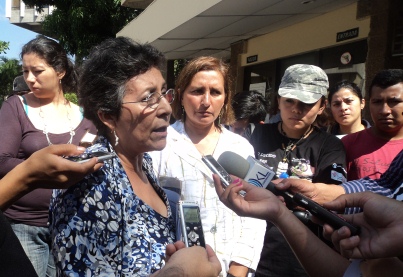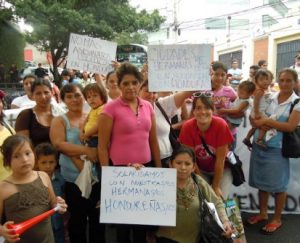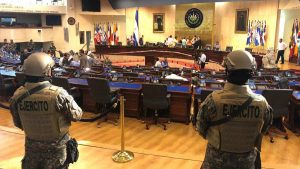Education, Human Rights, Politics
COHA Reports on “The Slide Towards Re-Militarization” in El Salvador
Social Movement Organizations File Lawsuit Against Unconstitutional Appointments of Ex-Generals
On February 21, a group of Salvadoran human rights organizations submittted a lawsuit alleging that the recent appointments of two former generals to the posts of Minister of Justice and Public Safety, and CEO of the National Police are unconsitutional. During the rally and press conference that accompanied the submission of the lawsuit, the social movement leaders called on the President to respect the laws of El Salvador, arguing that the appointments of General David Munguia Victorian Payes and General Francisco Ramon Salinas Rivera violate the Constitution’s articles 159 and 168, which prohibit army personal from taking leadership of these civilian security institutions. The organizations which signed on to the letter of unconstitutionality included the Foundation for Studies on the Application of Law (FESPAD), the Social Iniciative for Democracy (ISD) and The Institute for Women’s Studies (CEMUJER).
Click here for press coverage in the CoLatino newspaper of the press conference and rally>>
Council on Hemispheric Affairs Reports:Public Security in El Salvador: The Slide Towards Re-Militarization
February 16, 2012
Analysis was prepared by COHA Senior Research Fellow Frederick Mills and originally posted on www.coha.org/
The appointment of retired military officers to public security leadership positions over the past three months is being seen by many as a serious challenge to democracy in El Salvador. President Mauricio Funes argues that these appointments are legal, that they have not been done under either internal or external pressure, and that they constitute an appropriate response to public insecurity. There is indeed a genuine and intense preoccupation regarding security in El Salvador. A November 2011 poll by the University Institute of Public Opinion (IUOP) found that 76.4% of respondents believe that crime increased in 2011, as compared to 2010.[1] El Salvador has one of the highest homicide rates in the world (4,085 homicides, 66 per 100,000 persons in 2010).[2] Gang violence and transnational organized crime threaten both public security, such as the ability to conduct commerce and provide transportation services, as well as citizen security, such as the ability of individuals to exercise their civil rights.[3] Since the exercise of civil rights is a condition of democratic governance, this level of crime is in itself a threat to democracy in El Salvador.
On account of this pervasive insecurity, Salvadorans desperately seek after a solution. Previous “get tough” policies, the so called “heavy-handed” approach to law enforcement (Mano Dura, initiated in 2003), and the Super Mano Dura (starting 2004), have increased the number of arrests and incarcerations of alleged offenders, but have failed to rein in the gang problem; Salvadoran prisons are filled to over capacity and the gangs have adjusted their tactics.[4] Even the limited deployment of army units to assist in policing Salvadoran streets and prisons has not had the desired impact on crime.[5] Both the United States government and authorities in El Salvador acknowledge that the increasing number of criminal deportees from the United States back to their Central American venues has exacerbated the problem. For these reasons yet another “new” offensive against crime is in the works for El Salvador. This new offensive builds on the strategy of hemispheric security cooperation and the integration of anti-crime and prevention strategies. But here is the problem: While there is significant public support for Funes’ appointment of a “retired” general as the director of the National Civil Police (PNC), such appointments of career military officers to senior public security positions dangerously erodes the separation between public and military security functions.
A recent national poll by the Center for the Investigation of Public Opinion (CIOPS, Jan. 2012) indicates that 63.8% of the population favors the change in leadership of the National Civil Police (PNC) being called for by President Funes. Of those in favor of the appointment, 50.3% indicated that the change was necessary to implement new actions to reduce crime. 23.1% indicated that the last director did not obtain the desired results. 21.3% indicated that it would bring about more discipline in the PNC.[6] At the same time, however, there is grave concern by the Salvadoran left (FMLN), social organizations and in the human rights community that Funes has put in motion the re-militarization of civilian policing, in effect, weakening a pillar of the 1992 Peace Accords. This pillar was established to separate civil policing from military functions, and for good reasons. The memory of the Salvadoran civil war (1980 – 1991) keeps the historic link between a militarized police force and massive violations of human rights at the forefront of the security debate being staged inside El Salvador and a burning issue when it comes to the Salvadoran Diaspora.
The local debate over public security in El Salvador is informed by a regional politico—military context. El Salvador, Guatemala, and Honduras are facing a genuine threat to citizen security from both gangs and international organized crime; Central America has become a major transit point for the movement of drugs from suppliers in the South to consumers to the North. In response to the increasingly transnational nature of this issue there have been several regional and multilateral efforts to share information and concretize anti-crime strategies. For example, the Central American Integration System (SICA) and the OAS have held two series of meetings, workshops and conferences on these issues. In 2007, SICA announced “the U.S. government will pursue coordinated anti-gang activities through five broad areas: diplomacy, repatriation, law enforcement, capacity enhancement, and prevention.” [7] This commitment to regional cooperation has been translated into a significant commitment of US resources involving a swelling number of this country’s law enforcement agencies. The US has stepped up training and the provision of technical and material assistance to their law enforcement partners in El Salvador, Honduras, and Guatemala.
The case of Honduras, which has the highest homicide rate in the world, however, demonstrates that organized crime is not the only imminent threat to citizen security and democratic institutions in the region. Within a year of the June 28, 2009 coup against Honduras’ President Zelaya, Amnesty International reported that “police and military officers responsible for mass arrests, beatings and torture in the wake of the coup have not been brought to justice”[8] On February 14, 2012, United Nations Special Rapporteur Margaret Sekaggya said “The pervasive impunity and absence of effective investigations of human rights violations undermine the administration of justice and damage the public’s trust in authorities.”[9] Despite continuing impunity and allegations of mounting abuses, the Honduran Congress, last November, approved a new interpretation of the constitution that allows the executive branch to declare periods of emergency. These emergencies would permit the Honduran Army, Air force and Navy to perform civil policing functions and inexorably leads to the further compromise of the civil liberties of Honduran citizens. The devastation caused by the just witnessed Comayagua prison blaze may now bring more international attention to the urgent human rights and public security issues in Honduras.
Read full article here




